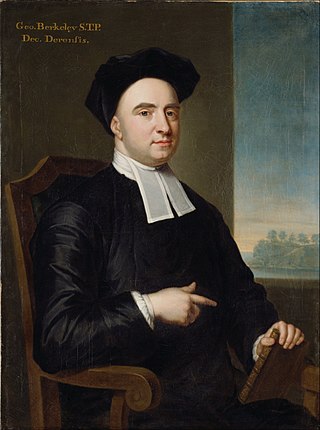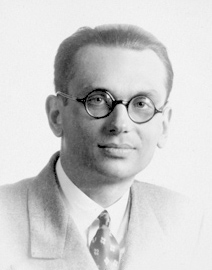Related Research Articles

David Hume was a Scottish Enlightenment philosopher, historian, economist, librarian, and essayist, who is best known today for his highly influential system of philosophical empiricism, skepticism, and naturalism. Beginning with A Treatise of Human Nature (1739–40), Hume strove to create a naturalistic science of man that examined the psychological basis of human nature. Hume argued against the existence of innate ideas, positing that all human knowledge derives solely from experience. This places him with Francis Bacon, Thomas Hobbes, John Locke, and George Berkeley as an empiricist.

George Berkeley – known as Bishop Berkeley – was an Anglo-Irish philosopher whose primary achievement was the advancement of a theory he called "immaterialism". This theory denies the existence of material substance and instead contends that familiar objects like tables and chairs are ideas perceived by the mind and, as a result, cannot exist without being perceived. Berkeley is also known for his critique of abstraction, an important premise in his argument for immaterialism.
George Sotiros Pappas is a professor of philosophy at Ohio State University. Pappas specializes in epistemology, the history of early modern philosophy, philosophy of religion and metaphysics. He is of Greek and English origin.

Kurt Friedrich Gödel was a logician, mathematician, and philosopher. Considered along with Aristotle and Gottlob Frege to be one of the most significant logicians in history, Gödel had an immense effect upon scientific and philosophical thinking in the 20th century, a time when others such as Bertrand Russell, Alfred North Whitehead, and David Hilbert were using logic and set theory to investigate the foundations of mathematics, building on earlier work by the likes of Richard Dedekind, Georg Cantor and Frege.

Plato was an ancient Greek philosopher born in Athens during the Classical period in Ancient Greece. In Athens, Plato founded the Academy, a philosophical school where he taught the philosophical doctrines that would later became known as Platonism. Plato was a pen name derived from his nickname given to him by his wrestling coach – allegedly a reference to his physical broadness. According to Alexander of Miletus quoted by Diogenes of Sinope his actual name was Aristocles, son of Ariston, of the deme Collytus.
William Payne Alston was an American philosopher. He is widely considered to be one of the most important epistemologists and philosophers of religion of the twentieth century, and is also known for his work in metaphysics and the philosophy of language. His views on foundationalism, internalism and externalism, speech acts, and the epistemic value of mystical experience, among many other topics, have been very influential. He earned his PhD from the University of Chicago and taught at the University of Michigan, Rutgers University, University of Illinois, and Syracuse University.

Francis Hutcheson LLD was an Ulster-Scot philosopher born in Ulster to a family of Scottish Presbyterians who became known as one of the founding fathers of the Scottish Enlightenment. He was Professor of Moral Philosophy at Glasgow University and is remembered as author of A System of Moral Philosophy.

Samuel Clarke was an English philosopher and Anglican cleric. He is considered the major British figure in philosophy between John Locke and George Berkeley. Clarke's altered, Nontrinitarian revision of the 1662 Book of Common Prayer continues to influence worship among modern Unitarians.

Sangharakshita was a British spiritual teacher and writer, and the founder of the Friends of the Western Buddhist Order, which in 2010 was renamed the Triratna Buddhist Community.
Francis Hutcheson was an Irish violinist, composer, physician and lecturer in chemistry. His surname was often misspelled as "Hutchinson". He published his music under the pseudonym "Francis Ireland".

Henri Lefebvre was a French Marxist philosopher and sociologist, best known for pioneering the critique of everyday life, for introducing the concepts of the right to the city and the production of social space, and for his work on dialectical materialism, alienation, and criticism of Stalinism, existentialism, and structuralism. In his prolific career, Lefebvre wrote more than sixty books and three hundred articles. He founded or took part in the founding of several intellectual and academic journals such as Philosophies, La Revue Marxiste, Arguments, Socialisme ou Barbarie, Espaces et Sociétés.
Thomas Anthony "T. A." Denny was an Irish bacon merchant, a self-described "pork philanthropist". Although not a member of the Salvation Army, he supported it financially. His philanthropic activities also included support for education. In April 1868, he married Mary Jane Noel (1829-1887), daughter of Baptist Wriothesley Noel. In 1893, he married the evangelist Elizabeth Hope, who was 24 years his junior. His son was the first-class cricketer and British Army officer Ernest Denny.

John L. Allen Jr. is an American journalist and author who serves as editor of the Catholic news website Crux, formerly hosted by The Boston Globe and now independently funded.

Palgrave Macmillan is a British academic and trade publishing company headquartered in the London Borough of Camden. Its programme includes textbooks, journals, monographs, professional and reference works in print and online. It maintains offices in London, New York, Shanghai, Melbourne, Sydney, Hong Kong, Delhi, and Johannesburg.
De Corpore is a 1655 book by Thomas Hobbes. As its full Latin title Elementorum philosophiae sectio prima De corpore implies, it was part of a larger work, conceived as a trilogy. De Cive had already appeared, while De Homine would be published in 1658. Hobbes had in fact been drafting De Corpore for at least ten years before its appearance, putting it aside for other matters. This delay affected its reception: the approach taken seemed much less innovative than it would have done in the previous decade.

Alciphron, or The Minute Philosopher is a philosophical dialogue by the 18th-century Irish philosopher George Berkeley wherein Berkeley combated the arguments of free-thinkers such as Mandeville and Shaftesbury against the Christian religion. It was first published in 1732.
Alexander Dicsone (1558–1603) was a Scottish writer and political agent. He is known also as the leading British disciple of Giordano Bruno. He used the pseudonym Heius Scepsius.
Thomas Edmund Jessop, was a British academic best known for his work on George Berkeley.

Cambridge criticism is a school in literary theory that focuses on the close examination of the literary text and the link between literature and social issues. Members of this group exerted influence on English literary studies during the 1920s. It has been characterized as Puritan due to its reluctance to consider literature simply as a matter for enjoyment.
References
- David Berman, Dr. Berkly's Books, Fortnight No. 308, Supplement: Francis Hutcheson (Jul. - Aug., 1992), p. 23. Published by: Fortnight Publications Ltd. Stable URL: https://www.jstor.org/stable/25553570